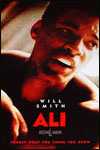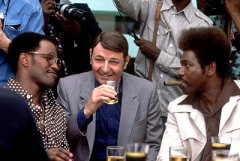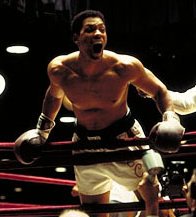|
Ali"I am the Greatest."
That's what Ali used to say, even using it for the title of the first bio-pic made about him, starring him. Despite the tremendous importance of his life story, the film quickly became nothing more than a punchline/footnote in his career. Ali failed at playing Ali.
So it seems like some sort of hubris that director Michael Mann would attempt to capture this man on film with someone other than The Greatest. More than a few of us had to be startled by his choice. Will Smith? The Fresh Prince of Bel-Air? Sure, he can punch out alien invaders, but Sonny Liston? Not a chance.
Actually, as annoying as Smith's own recent boasting has become, Ali has the stuff, capturing the man, the myth, and the time. While it falls a little short of its ambition, well, man's reach must ever exceed his grasp, else what is bragging for?
The film covers a turbulent time in the life of both Ali and the nation. Starting in 1964, Mann weaves a complex tapestry of the times. A young boxer named Cassius Clay (Smith), soon to be Muhammed Ali, trains for his title shot, while the nation grooves to the music of Sam Cooke, and soon, The Beatles. Intercut with this are scenes of Clay's youth and the racism that shaped his attitudes. So smooth and engrossing are the images that you hardly notice that little actual dialogue occurs. And yet, Mann gives you a strong sense of the forces at work, while introducing the major players in an almost kaleidoscopic fashion.
Unfortunately, as a result many characters only barely register. Ron Silver and Paul Rodriguez play two of Ali's trainers, and only boxing fans would know who they actually are, so thinly drawn are they. Ali's wives fare little better, like Silver and Rodriguez cast for their recognizability to make up for the lack of actual character.
But Mann has always been a director more interested in image, and with this subject he deals with a man who has
lost himself in the character he created. As such, only those people also trapped in their personas can have a hope of holding any screen time. Mario Van Peebles makes a strong impression as the iconic Malcolm X, a man killed for refusing to remain static in his views on race. In another of his long line of late career Lon Chaney moves, Jon Voight fully inhabits Howard Cosell without resorting to the cheap impersonation that even Cosell became at the end of his life.
While charting Ali's rise, fall, and amazing rise again, the film examines what happens when a public persona takes over. Seemingly politically unaware, the self-proclaimed "people's champion" (long before The Rock) repudiates those his religion dictates he must, including Malcolm X and eventually his first wife. Privately, these acts tear him apart, but as a Muslim and a champion, he knows he has an image to maintain.
Impressively, the film does not paint the image of a perfect man, either. Ali's refusal to submit to the draft may have been less political conviction than just not wanting to stop boxing, and the script leaves that an open question. (Ironically, he did get banned from boxing for a time as a result.) Forces conspire to make him a political symbol while he sits haplessly by, just trying to be himself. But by the time Ali gets his shot in Zaire (the famed "Rumble in the Jungle"), it is clear that this is a man struggling to be as big as the legend he has created for himself.
Of course, the strength of a film about a boxer has to rest in its boxing scenes, and this film delivers. Each key fight has a poetry, grace, and grip to it. Somehow the emotional stakes come through each time, and even though these are recreations, they carry high drama.
At the center of it all stands Smith, in one of the best performances of the year. He trained hard, and it shows, appropriating Ali's style both physically and vocally. If he still looks a little small, it's only because Ali is a great bear of a man that Smith could never really be. But close your eyes, and you will swear that Muhammed Ali walks across that screen. Open them, and you may still have that conviction. Heavy-lidded, strangely low-key until he roars with pride, Will Smith truly has become Ali.
It's not a performance in a vacuum, either, as he shows real connection with everyone in his life. In particular the affection between Ali and Cosell comes off as surprising but utterly believable.
Because of the tremendous scope of the film, even in only capturing ten years of the champ's life, you may need to wait for DVD or hit the library to have a hope of catching everything that's going on. (The choice of Sam Cooke at the beginning, for example, may be because Cooke was shot and killed in 1964 by a white hotel owner who allegedly resented the black man's success.) It's a dense, detailed film that will sweep you along. You'll just wish you knew more about it.
What's It Worth? $7.50
Copyrights and trademarks for existing
entertainment (film, TV, comics, wrestling) properties are held by their
respective owners and are used with permission or for promotional purposes
of said properties. All other content ™ and © 2001 by FanboyPlanet.
If you want to quote us, let us know. We're media whores.















